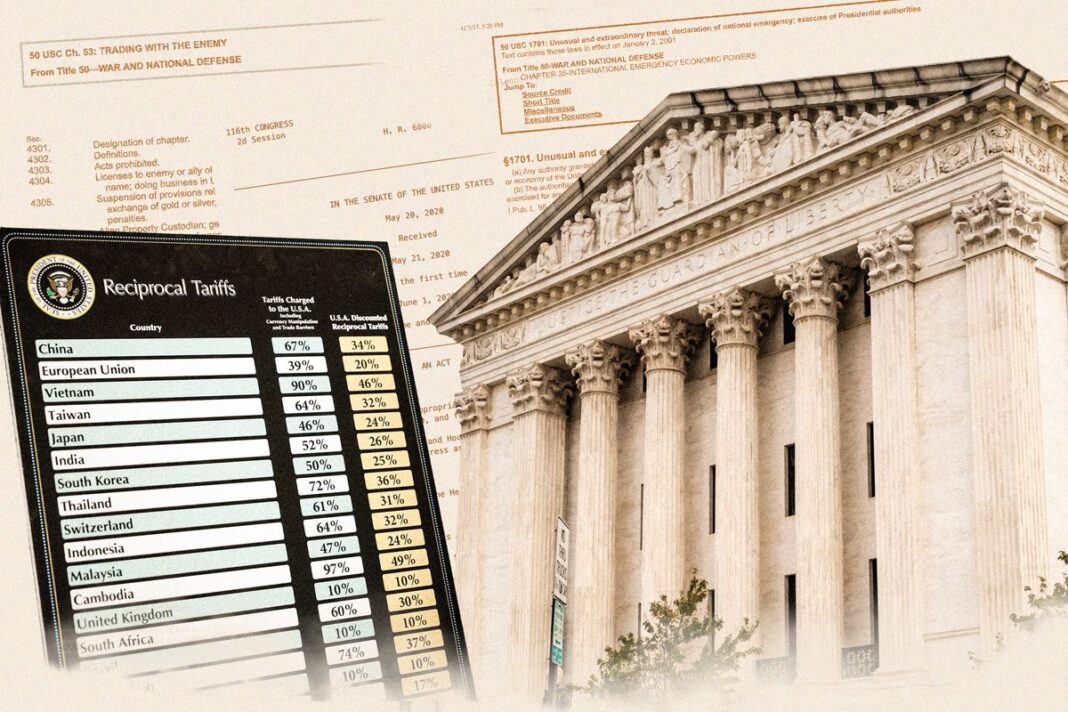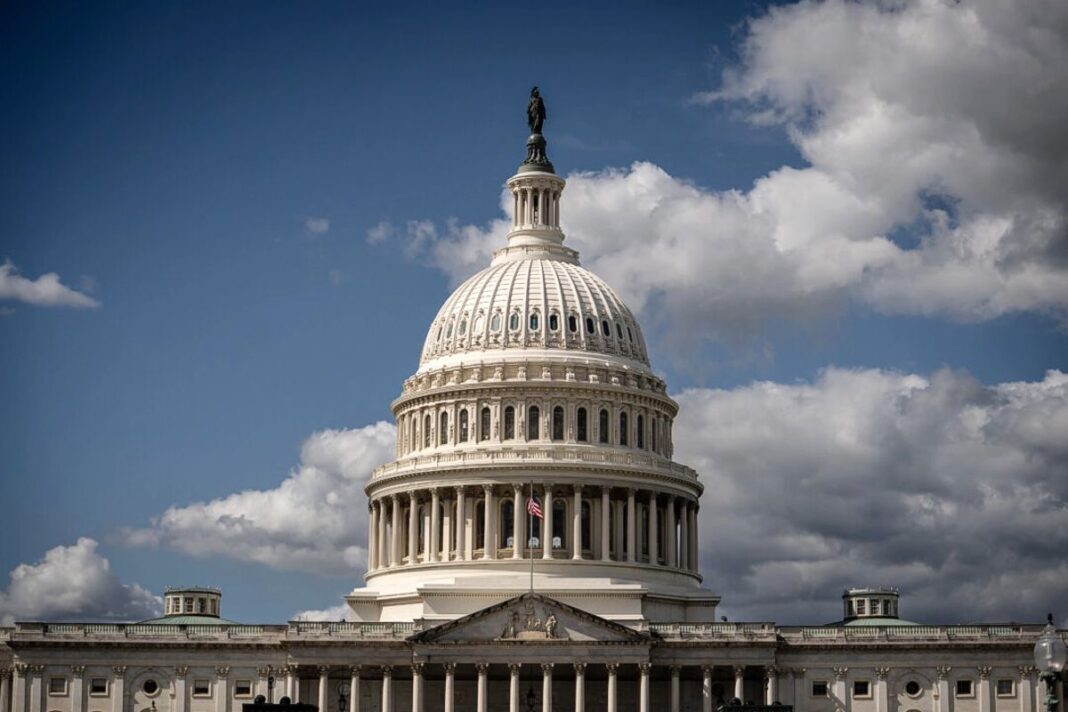The court will determine the fate of Trump’s global tariffs, which were levied in response to chronic trade imbalances and decades of unfair trade practices.
The Supreme Court is set to hear oral arguments on Nov. 5 in a landmark case over the legality of President Donald Trump’s global tariffs.
More specifically, the justices are expected to hear two cases—Learning Resources, Inc. v. Trump, and Trump v. V.O.S. Selections, Inc.—for at least 80 minutes with input from various parties. According to the court, oral arguments will include 40 minutes from the Trump administration and 20 minutes each for both the private businesses and states challenging Trump’s policy.
Whatever the ruling, the case could have major implications for the nation’s economy and determine how much future presidents can alter trade. Here’s what you need to know heading into oral arguments.
1. What Are the Cases About?
The cases center on two groups of tariffs that the Trump administration imposed earlier this year. One group targeted Mexico, Canada, and China over their alleged failure to address fentanyl trafficking, and the other set included a lengthy list of reciprocal tariffs on countries worldwide.
The tariffs were imposed under a 1977 emergency powers law—the International Emergency Economic Powers Act. Trump is the first president to impose tariffs under this law, although President Richard Nixon used an identical provision in a predecessor law in 1971—the Trading with the Enemy Act of 1917—to declare a trade emergency and issue 10 percent tariffs on all imports.
Trump established the fentanyl tariffs in February in response to the three countries’ failure to stem the flow of illegal opioids into the United States, which created a national emergency, including a public health crisis, according to his executive orders.
The president cited the hundreds of thousands of overdose deaths of Americans and the drug crisis’s impact on the health care system, communities, and families. Mexico and Canada were also penalized for failing to stem illegal immigration.
In enacting the reciprocal tariffs in April, Trump declared an emergency over large and persistent U.S. trade deficits caused by decades of unfair trade practices by other countries in the form of tariffs and nontariff barriers.
The persistent trade imbalance has threatened national and economic security, Trump’s executive order states, by hollowing out the country’s manufacturing capacity, undermining critical supply chains, and causing the defense industry to be dependent on foreign adversaries.
2. The Stakes
Trump has said that winning the case will be “vital to the interests” of the United States. Tariffs have been used against the country for years, causing the United States to lose its domestic industries, he said in an October interview with Fox Business.
The president noted that he was able to stop several wars by using the threat of tariffs as leverage, including one earlier this year between Pakistan and India.
As of Sept. 23, revenue from tariffs imposed under the emergency law hit nearly $90 billion in fiscal year 2025, according to data by U.S. Customs and Border Protection. That’s nearly half the total tariff revenue collected in the fiscal year.
The United States faces a trade deficit of more than $1 trillion, and the Congressional Budget Office has estimated that the tariffs will reduce federal deficits by $4 trillion, according to a Justice Department (DOJ) filing.
So far, the Trump administration has reached trade deals with several countries, including the U.K., the European Union, Japan, and South Korea. These deals have led to more than $2 trillion in purchases and investment commitments in the United States.
Should the administration lose the case, Treasury Secretary Scott Bessent has said that the government could invoke other authorities to implement tariffs, although they are “not as efficient, not as powerful.”
Private companies have urged the Supreme Court to rule against the Trump administration, arguing that the tariffs represent hundreds of billions of dollars in new taxes. Some outside estimates have also been critical of the tariffs.
For example, the Peterson Institute for International Economics stated in September that U.S. businesses had absorbed much of the tariff costs through July, and consumers could see higher prices.
3. Emergency Powers Law
The Supreme Court is set to review whether the tariffs are authorized by the International Emergency Economic Powers Act (IEEPA). The law authorizes the president to take a range of actions in response to emergencies.
It allows the president to declare a national emergency to deal with any “unusual and extraordinary threat” to the country’s national security, foreign policy, or economy.
In court, the DOJ has defended the Trump administration’s invocation of the law to impose tariffs by pointing to a section that allows presidents to regulate imports.
That provision allows the president to “investigate, block during the pendency of an investigation, regulate, direct and compel, nullify, void, prevent or prohibit, any acquisition, holding, withholding, use, transfer, withdrawal, transportation, importation or exportation of, or dealing in, or exercising any right, power, or privilege with respect to, or transactions involving, any property in which any foreign country or a national thereof has any interest.”
In arguing that the levies were not authorized by the law, challengers have highlighted that the provision doesn’t include the word tariffs.
The justices are expected to consider not only whether the law allows the tariffs but also whether the law was constitutional.
Because the Constitution grants tariff power to Congress, there is a question over whether the emergency law violated the nation’s separation of powers by unconstitutionally delegating tariff authority to the president.
4. What Did Lower Courts Decide?
So far, multiple federal courts—including the U.S. Court of International Trade and the U.S. District Court for the District of Columbia—have stated that Trump’s tariffs are unlawful, but delayed the effects of their orders blocking the tariffs.
The U.S. Court of Appeals for the D.C. Circuit halted oral arguments for one of the cases after the Supreme Court granted certiorari, or took it up for further consideration. The Supreme Court is expected to review that case, as well as one that the U.S. Court of International Trade ruled on in May. That ruling against Trump’s tariffs was affirmed by the U.S. Court of Appeals for the Federal Circuit in August.
Both the district court in Washington and the Federal Circuit have noted that the law does not use the term tariffs. According to the court in Washington, regulating imports entails controlling them through rules, whereas tariffs are taxes on imports or exports.
U.S. District Judge Rudolph Contreras said that even if Congress authorized the tariffs, doing so would violate the nondelegation doctrine, a rule that generally prevents Congress from delegating its legislative powers to other entities. The doctrine has limits, however, and Congress can delegate authority if it provides some limits on how the president uses that authority.
The Federal Circuit stated that Congress would have had to use more explicit language if it had intended to allow presidents to impose large-scale tariffs, as Trump has.
5. What Is the Administration’s Argument?
In briefing the Supreme Court, the DOJ made multiple arguments in favor of the tariffs.
Among other things, it argued that the law’s plain text authorizes the tariffs and that the power to regulate imports encompasses tariffs or duties on imports.
It noted that the IEEPA was intended as a successor to the Trading with the Enemy Act, which used similar language and was held by a federal court to authorize tariffs imposed by Nixon.
Moreover, the nondelegation doctrine is less applicable in cases that involve foreign affairs over which the president has authority under Article II of the Constitution, the DOJ argued. And even if the doctrine did apply, Congress clearly outlined the president’s authority in a way that would satisfy the requirements under the doctrine.
6. Major Questions Doctrine
While it’s difficult to predict how the Supreme Court will rule, arguments in the case and the court’s prior decisions indicate a concern for the separation of powers. Under Chief Justice John Roberts, the court has utilized a test known as the Major Questions Doctrine to rule against large-scale policies from the executive branch.
That doctrine states that administrative agencies need clear congressional authorization before making decisions of major economic or political importance. The court notably used the doctrine to strike down one of President Barack Obama’s climate policies, as well as one of President Joe Biden’s student loan forgiveness programs.
Both of those cases were cited by the Federal Circuit when it ruled against Trump. It compared the language in the IEEPA and the Health and Economic Recovery Omnibus Emergency Solutions Act (HEROES Act), which the Biden administration invoked to forgive student loans. It suggested that in both cases, the executive branch was going beyond what Congress’s language authorized.
“The Executive’s use of tariffs qualifies as a decision of vast economic and political significance,” the court’s majority stated.
It stated that, given the importance, the administration must obtain clear authorization from Congress.
Besides arguing that the law was clear in authorizing the tariffs, the DOJ stated that the Major Questions Doctrine doesn’t apply in this case because the rule applies to agencies.
“Here, Congress delegates authority directly to the President,” its brief reads.
The government also contended that the doctrine hasn’t been applied in the context of foreign affairs. The brief pointed to a concurrence Justice Brett Kavanaugh wrote in an opinion in June.
In that opinion, Kavanaugh said that “the major questions canon has not been applied by this Court in the national security or foreign policy contexts, because the [doctrine] does not reflect ordinary congressional intent in those areas.”
“On the contrary, the usual understanding is that Congress intends to give the President substantial authority and flexibility to protect America and the American people,” he said.
By Sam Dorman








